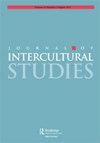回归的永久想象和流动的现实:论澳大利亚尼泊尔和中国移民的回归愿望和矛盾心理
IF 1
Q3 SOCIOLOGY
引用次数: 0
摘要
本文扩展了对移民回归的欲望和愿望的分析,以两个尼泊尔和中国移民群体在澳大利亚的回归问题为背景,考察了回归问题的意义和情感。虽然已有研究深入探讨了回归与重新融入劳动力市场、回归后的调整或社会汇款相关的各个方面,但在这里,我们将回归视为一种内在的移民经历,而不是实际的物质回归。我们利用对家庭的文化理解,主要是“归故耿”和“孝道”的概念,来审视这两个移民群体对回归的共同想象,并将我们的分析置于“回归的流动性”框架中,以展示回归是如何被不断推迟的,或者回归是如何无法实现的。我们认为,尽管在类似的家庭文化观念的影响下,人们对回归有着永久的想象,但在现实中,回归仍然是不稳定的,并因与母国和东道国有关的多种因素而变得复杂,包括母国提供的机会水平以及澳大利亚的职业、家庭和伙伴关系/关系的机会。本文提供的数据来自于对尼泊尔教育移民和在澳大利亚的中国职业女性移民进行的两项定性研究。本文章由计算机程序翻译,如有差异,请以英文原文为准。
Permanent Imaginaries of Return and Fluid Realities: On Return Aspirations and Ambivalence among Nepali and Chinese Migrants in Australia
ABSTRACT Extending the line of analysis on migrants’ desires and aspirations to return, this article examines the meanings and emotions attached to the question of return in the context of two migrant groups from Nepal and China in Australia. While studies have delved into aspects of return associated with reintegration into the labour market, adjustment upon return, or social remittances, here we examine return as an embedded migration experience rather than actual physical return. We draw on the cultural understanding of family, mainly the notions of Luoyeguigeng and filial piety to examine the common imaginaries of return among both migrant groups and situate our analysis within the ‘fluidity of return’ framework to show how return is continually postponed or how return might not materialise. We argue that despite the permanent imaginaries of return, shaped by similar cultural ideas of family, return remains fluid in reality, complicated by multiple factors attached to home and host country, including the levels of opportunities afforded by the home countries as well as the opportunities for careers, family and partnership/relationships in Australia. The data presented here draws on two qualitative studies conducted among Nepali education migrants and Chinese professional women migrants in Australia.
求助全文
通过发布文献求助,成功后即可免费获取论文全文。
去求助
来源期刊

Journal of Intercultural Studies
SOCIOLOGY-
CiteScore
1.80
自引率
10.00%
发文量
67
期刊介绍:
Journal of Intercultural Studies showcases innovative scholarship about emerging cultural formations, intercultural negotiations and contemporary challenges to cultures and identities. It welcomes theoretically informed articles from diverse disciplines that contribute to the following discussions: -Reconceptualising notions of nationhood, citizenship and belonging; -Questioning theories of diaspora, transnationalism, hybridity and ‘border crossing’, and their contextualised applications; -Exploring the contemporary sociocultural formations of whiteness, ethnicity, racialization, postcolonialism and indigeneity -Examining how past and contemporary key scholars can inform current thinking on intercultural knowledge, multiculturalism, race and cultural identity. Journal of Intercultural Studies is an international, interdisciplinary journal that particularly encourages contributions from scholars in cultural studies, sociology, migration studies, literary studies, gender studies, anthropology, cultural geography, urban studies, race and ethnic studies.
 求助内容:
求助内容: 应助结果提醒方式:
应助结果提醒方式:


